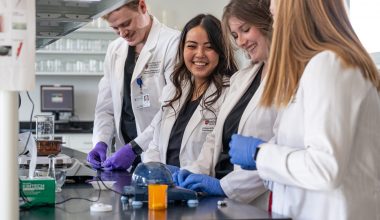Packaging science is a rapidly evolving field that plays a vital role in various industries, from consumer goods to pharmaceuticals.
As the demand for innovative and sustainable packaging solutions grows, the need for skilled professionals in this domain has become increasingly important. Choosing the right college or university can be a game-changer if you’re considering a career in packaging science.
In this blog post, we’ll look at some of the best packaging science colleges that offer comprehensive programs to help you develop the necessary skills and knowledge to succeed in this dynamic industry. Let’s have a look!
Table of contents
- What is Packaging Science?
- What Do People in Packaging Science Do?
- Is Packaging Science or Art?
- How Long Does It Take to Complete a Packaging Science Program?
- Requirements to Enroll in Packaging Science Colleges
- Where Do People Who Study Packaging Science Work?
- Best Packaging Science Colleges
- How to Choose the Best Packaging Science College
- Frequently Asked Questions
- Conclusion
- References
- Recommendations
What is Packaging Science?
Packaging Science is a multidisciplinary field that focuses on designing, developing, and implementing packaging solutions for products across various industries. It encompasses the scientific, engineering, and creative aspects of creating packaging that protects and preserves the contents and enhances their marketability and user experience.
Packaging scientists explore materials, technology, sustainability, consumer behavior, and logistics to develop innovative and efficient packaging designs. They consider product safety, cost-effectiveness, environmental impact, and regulatory compliance throughout the packaging lifecycle.
Professionals in Packaging Science collaborate with product developers, marketers, engineers, and manufacturers to create packaging solutions that meet different products and industries’ unique needs. With the increasing emphasis on sustainability and eco-friendly practices, Packaging Science plays a crucial role in driving responsible packaging practices and reducing waste.
Read: Can I Get Student Loans Before School Starts? Best Expert Advice
What Do People in Packaging Science Do?
Professionals in the field of Packaging Science have a wide range of responsibilities to ensure efficient and effective packaging solutions. They also conduct research and development activities to explore innovative materials, technologies, and design techniques.
This includes assessing packaging materials’ physical and chemical properties, analyzing their compatibility with products, and optimizing packaging designs for functionality and aesthetics.
Packaging scientists collaborate with cross-functional teams to understand the requirements of different products and industries. They apply their knowledge to create packaging designs that meet specific needs, such as ensuring product safety, extending shelf life, and enhancing consumer appeal. They also consider factors like cost-effectiveness, sustainability, and regulatory compliance throughout the packaging process.
Additionally, professionals in Packaging Science may oversee quality control measures, manage packaging production, and evaluate the environmental impact of packaging choices. They stay updated on industry trends and advancements to drive innovation and address evolving consumer preferences.
Is Packaging Science or Art?
Packaging Science encompasses elements of both science and art. While it relies on scientific principles and engineering concepts to ensure the functionality and integrity of packaging, a significant artistic component is also involved.
Packaging scientists apply their creativity and design expertise to develop visually appealing packaging solutions that capture consumers’ attention and effectively communicate the brand’s message. They consider factors such as color psychology, typography, graphics, and structural design to create packaging that stands out on store shelves and resonates with the target audience.
However, the artistic aspects of packaging design are always guided by scientific principles. Packaging must fulfill practical requirements, such as product protection, ease of use, and transportation efficiency. Balancing aesthetics with functionality is the key to successful packaging design, making Packaging Science a harmonious blend of science and art.
Also Read: 10 Best Homeland Security Colleges 2024
How Long Does It Take to Complete a Packaging Science Program?
The duration of a packaging science program can vary depending on the level of education pursued. A typical bachelor’s degree program in packaging science usually takes four years.
This timeframe allows students to comprehensively understand the discipline through core courses, electives, and practical experiences. The curriculum covers various topics, including materials science, package design, manufacturing processes, sustainability, and supply chain management.
Furthermore, the program may include internships or co-op opportunities, providing students with hands-on industry experience. In some cases, students may pursue advanced degrees such as a master’s or doctoral program, which can add two to six years of study, depending on the level of specialization and research involved.
The length of the program is designed to ensure students acquire the necessary knowledge, skills, and practical expertise required for success in the field of packaging science.
Requirements to Enroll in Packaging Science Colleges
The specific requirements for enrolling in packaging science colleges can vary between institutions. However, there are some common prerequisites to consider. Most colleges typically require a high school diploma or its equivalent.
Additionally, applicants may need to submit their high school transcripts, standardized test scores (such as SAT or ACT), letters of recommendation, and a personal statement or essay.
Some packaging science programs may have specific requirements, such as mathematics, chemistry, or physics prerequisite courses. A strong background in science, technology, engineering, or mathematics (STEM) subjects is also beneficial. Demonstrating an interest in packaging or related fields through extracurricular activities, internships, or work experience can also enhance an applicant’s profile.
It’s important to note that admission criteria can vary, so it’s advisable to consult the specific requirements of each packaging science college you are interested in to ensure you meet all the necessary qualifications.
Read Also: What Majors Is John Hopkins Known For In 2024 | Full Guide
Where Do People Who Study Packaging Science Work?
Individuals who study packaging science have a wide range of career opportunities across various industries. They can find employment in consumer goods, food and beverage, pharmaceuticals, healthcare, e-commerce, logistics, and manufacturing sectors.
Graduates with a degree in packaging science may work as packaging engineers, designing and testing packaging solutions. They may also pursue roles as packaging designers, focusing on creating visually appealing and functional packages.
Other potential career paths include packaging technologists, quality assurance specialists, sustainability analysts, supply chain managers, and regulatory compliance experts.
Packaging science professionals can find employment in packaging companies, manufacturing firms, research and development laboratories, consulting firms, and government agencies.
They may also work in cross-functional teams, collaborating with product developers, marketers, and engineers to ensure the successful development and implementation of packaging solutions.
Best Packaging Science Colleges
Below are the best packaging science colleges in 2024:
- Michigan State University:
- Clemson University:
- Rochester Institute of Technology (RIT):
- Rutgers University:
- University of Wisconsin-Stout:
Michigan State University:
Michigan State University (MSU) is among the best packaging science colleges due to its comprehensive curriculum and industry partnerships. The School of Packaging at MSU offers cutting-edge research facilities, state-of-the-art laboratories, and hands-on experiential learning opportunities.
MSU’s packaging science program offers diverse packaging materials, design, sustainability, and supply chain management courses. The college’s strong industry ties provide students with invaluable networking opportunities, internships, and job placements.
Through collaborations with leading packaging companies, MSU ensures that students receive a relevant and comprehensive education aligned with industry practices. Students gain hands-on experience and build connections that pave the way for successful careers in the packaging industry.
Check this: What is High School Called in England? The British Education System
Clemson University:
Clemson University’s Department of Food, Nutrition, and Packaging Sciences excels in preparing students for successful careers in packaging science. The program emphasizes practical training through experiential learning and industry collaborations.
Clemson University offers students the advantage of working with esteemed faculty members who are recognized experts in the packaging science field. These faculty members conduct influential research on crucial subjects like sustainable packaging and advanced materials.
Clemson’s commitment to interdisciplinary education ensures students understand packaging science comprehensively. By integrating engineering, marketing, and sustainability elements into their curriculum, students gain a holistic perspective that prepares them to address the complex challenges and emerging trends in the packaging industry.
Rochester Institute of Technology (RIT):
RIT’s Packaging Science program is widely recognized for its strong industry connections and hands-on approach to learning. The program combines theoretical knowledge with extensive lab experiences, enabling students to apply their skills to real-world packaging challenges.
RIT’s packaging science lab has cutting-edge equipment, allowing students to conduct research and development projects. The program also emphasizes sustainable packaging solutions, preparing students to address the industry’s evolving environmental concerns.
Read this: 20 Free Accredited High School Diploma Online, No Cost
Rutgers University:
Rutgers University’s packaging engineering program is renowned for integrating engineering principles and practical packaging applications. The program offers a comprehensive curriculum that covers packaging materials, design, manufacturing, and distribution.
Students benefit from access to state-of-the-art facilities, including packaging labs and testing equipment. Rutgers’ strong industry ties provide students with internship opportunities and exposure to leading packaging companies, enhancing their career prospects upon graduation.
University of Wisconsin-Stout:
The University of Wisconsin-Stout’s Packaging program distinguishes itself through its hands-on learning approach and emphasis on industry collaboration.
Students have access to a dedicated packaging lab equipped with advanced technology, allowing them to gain practical experience in package testing, design software, and prototyping.
The program’s close partnerships with local and national companies provide students with valuable internship and job placement opportunities. The program’s faculty also brings industry experience, ensuring students receive industry-relevant knowledge and mentorship.
These five colleges stand out as the best in the field of packaging science due to their comprehensive curriculum, hands-on learning opportunities, strong industry connections, and state-of-the-art facilities.
They equip students with the necessary knowledge and skills to excel in the dynamic and evolving packaging industry, preparing them for successful careers in various sectors, from consumer goods to healthcare.
Also, read: How To Prepare For Freshman Year Of College in 2024| 20 Tips
How to Choose the Best Packaging Science College
Choosing the best packaging science college requires careful consideration of several factors. Start by researching the reputation and accreditation of the institutions you are considering. Look for colleges with a strong track record in packaging science education and positive industry recognition.
Consider the curriculum, ensuring it covers the key areas of packaging science that interest you, such as materials, design, sustainability, and supply chain management. Evaluate the faculty’s expertise and industry experience to ensure they can provide quality education and mentorship.
Additionally, assess the resources available, including research facilities, internships, and industry connections. Consider the location, cost, and potential career opportunities each college offers. Finally, reach out to current students or alumni for their insights and experiences to help make an informed decision.
Also, read this: Georgetown University Acceptance Rate: Requirements, SAT/ACT Scores, GPA, & Admission.
Frequently Asked Questions
Packaging science is important because packaging is crucial in product protection, preservation, and marketability. It ensures that products reach consumers in optimal condition while considering sustainability, cost-effectiveness, and regulatory compliance. Packaging science professionals contribute to designing innovative packaging solutions, reducing environmental impact, and meeting consumer demands.
Packaging science offers diverse career opportunities. Graduates can work as packaging engineers, designers, technologists, quality assurance specialists, sustainability analysts, and supply chain managers in consumer goods, food and beverage, pharmaceuticals, healthcare, logistics, and manufacturing.
Key skills for success in packaging science include knowledge of packaging materials, design principles, and manufacturing processes. Proficiency in technical software, problem-solving abilities, attention to detail, and an understanding of sustainability practices are also valuable. Effective communication, teamwork, and project management skills are essential for collaborating with cross-functional teams.
Conclusion
Choosing the right packaging science college can lead you to a successful and rewarding career in this dynamic field.
Focusing on hands-on experience, cutting-edge research, and industry partnerships, these colleges provide students with the knowledge and skills needed to thrive in the packaging industry.
Attending one of the top packaging science colleges will equip you with the tools to innovate, problem-solve, and lead in this growing field. So why wait? Start your journey towards a fulfilling career in packaging science today by exploring these top institutions and taking the first step towards achieving your goals
References
- universities.com – Bes Packaging Schools
- collegefactual.com – Best Packaging Science Schools
- packaginrevolution.net – Best Colleges for Packaging Science



